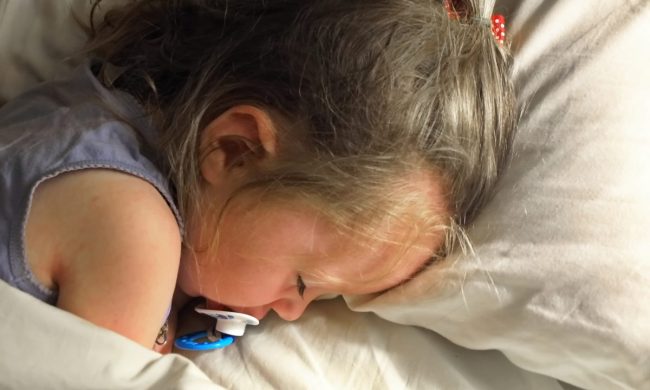So many changes when your child becomes a teen. A lot of the rules that applied to them when they were younger don’t apply now, but does that include a bedtime? Even a later one? Even though they’re not children anymore, teens still need adequate sleep. Sleep is a large determining factor in predicting a teen’s health and success in school. So should your teen have a bedtime? The answer depends on your child and their habits.
How much sleep does a teenager need to get?

According to the American Academy of Sleep Medicine, adolescents aged 13 to 18 should get eight to 10 hours of sleep in a 24-hour period. Children between the ages of 6 and 12 need slightly more — 9 to 12 hours a day.
What happens if a teen doesn’t get enough sleep?

About 65% of American secondary students (ages 12 to 18) do not usually get enough sleep. Both short-term and long-term sleep deprivation are harmful to health. Short-term consequences include increased stress and sensations of pain and decreased emotional regulation, cognition, memory, and performance. If a teenager does not sleep enough for an extended amount of time, they are at a heightened risk for accidents, high blood pressure, obesity, diabetes, depression, self-harm, suicidal ideation, and suicide attempts.
Are there any benefits to setting a bedtime for a teenager?

Studies have found that set bedtimes help teenagers regularly get adequate sleep. Maintaining a set bedtime has also been associated with improved daytime functioning and a reduced risk for depression and suicide. And in turn, sleeping enough is associated with a realm of benefits. Among these are improved memory, learning, emotional regulation, behavior, attention, and mental and physical health.
But it is difficult to set an early bedtime for a teenager as a routine. Due to the average high schooler’s demanding schedule and a teenager’s biology, a bedtime of 10 p.m. is often unrealistic. If a student is in class from 8 a.m. to 3 p.m. and has marching band practice from 3:30 to 5:30, that only leaves 4.5 hours before they are supposed to sleep. During those hours, a teenager needs to eat dinner, do homework, and get ready for bed … and they probably also want some leisure time. This can lead to a usual bedtime of midnight or later. Teenagers sleep longer and better and have better grades and attendance when school start times are later than 8:30.
Regardless of their school schedule, an adolescent’s circadian rhythm is slightly different than that of an adult or younger child. The circadian rhythm is like a biological clock that regulates sleep and wake cycles and the timing of hormone release, among other things. Many teenagers have a sleep phase delay, meaning their body feels the need to go to bed and wake up later. Society requires them to wake up earlier than is in sync with their circadian rhythm, contributing to excessive sleepiness during the day.
Although it may be later than ideal, consider setting a bedtime of some sort for your teenager. Even if it is midnight, maintaining a consistent sleep schedule is of utmost importance in getting enough sleep. To make up for the sleep they are missing overnight, students can take a nap when they come home from school.
How to enforce bedtime with a teen

Let’s face it, enforcing bedtime with a moody child may not be as easy as it once was when your child was smaller. It can be challenging, but consistency and communication are key. Parents should start by having an open discussion about the importance of sleep for their teen’s health, mood, and academic performance. Setting a reasonable bedtime based on their age and school schedule, rather than simply imposing rules, helps your teen understand why a bedtime is being implemented.
Encouraging good sleep habits, such as limiting screen time before bed, creating a relaxing nighttime routine, and setting clear expectations, can make it easier for teens to stick to a schedule. If resistance persists, tying bedtime to privileges—like extended weekend hours or additional screen time—can reinforce the importance of a good night’s rest while still allowing the teen to feel a sense of control.
How else can I help my teenager get a good night’s sleep?

There are other components to good sleep hygiene besides a normal bedtime. A calm, quiet, cool, and dark sleeping space is ideal for anyone to sleep soundly. Additionally, teens should avoid caffeinated and sugary beverages and food, as well as exposure to bright lights and electronic screens, for at least one hour before bedtime. You might implement a technology curfew for your children to foster that habit.
Though not nearly as crucial as a consistent bedtime, a regular bedtime routine helps train a teenager’s body to know when it is time to sleep. Another suggestion is to have them meditate or practice another relaxation technique shortly before bed. If they still can’t fall asleep after some time, advise them to get out of bed and do a quiet activity such as reading until they feel sleepy.
Hopefully, we have helped you in deciding whether or not your teenager should have a bedtime. As you have now learned, maintaining consistent bedtimes contributes to good sleep hygiene. And good sleep is fundamental to everyone’s daily functioning, so be sure you are modeling and establishing healthy sleep habits in your household.




